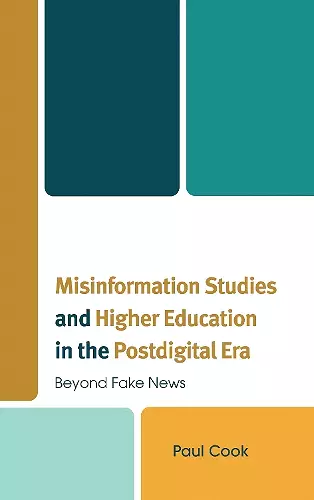Misinformation Studies and Higher Education in the Postdigital Era
Beyond Fake News
Format:Hardback
Publisher:Bloomsbury Publishing PLC
Published:29th Jan '25
Currently unavailable, and unfortunately no date known when it will be back

This book posits that universities can thrive amidst misinformation and post-truth polarization by developing a metadisciplinary approach: misinformation studies. We must reframe our disciplinary investments around the fact of misinformation, which is a consequence and catalyst of our politically divided, postdigital environment.
In Misinformation Studies and Higher Education in the Postdigital Era: Beyond Fake News, Paul Cook argues that the epistemological complexity of the postdigital age demands a new, metadisciplinary approach to information and media – misinformation studies. Cook posits that institutions of higher education can work toward regaining the public’s trust and reinvigorating general education programs by developing a metadiscipline that directly addresses the problem of misinformation in all its various and dangerous forms. This book outlines how such a curricular pivot may be accomplished in an age saturated with generative AI, algorithmic manipulation, ubiquitous networked computing, and information overload, coupled with the myriad challenges higher education faces from seemingly all sides. Ultimately, this book makes a compelling case that universities and colleges can instead harness the fragmentation caused by this ‘perfect storm’ currently facing higher education so they can not only weather the crisis, but also emerge stronger because of it.
In Misinformation Studies and Higher Education in the Postdigital Era: Beyond Fake News, Paul Cook deftly navigates the intricate and often turbulent waters of our contemporary information landscape. This book transcends simplistic notions of ‘fake news,’ acknowledging the complex, material, and deeply embedded nature of our information ecosystems. It’s a vital contribution, not just because it acknowledges the current challenges in academia, but because it provides a robust, metadisciplinary framework for understanding and addressing mis-, dis-, and malinformation.
By harnessing the power of academic disciplines and fostering a collaborative, interdisciplinary approach, this work offers a much-needed antidote to the often fragmented and reactive responses to information disorder. It acknowledges that effective solutions require a nuanced understanding of the social, technological, and cultural forces at play. This book is a crucial resource for educators, researchers, and anyone seeking to navigate the complexities of information and media literacy, offering a path towards a more informed and resilient society.
Paul Cook expertly weaves together interdisciplinary conversations pertaining to mis-, dis-, and malinformation in an enlightening, yet accessible, manner. His work gets readers thinking about these subjects in complex ways that move beyond the typified—and reductive—notions portrayed in the media and popular culture. I am excited to add Misinformation Studies and Higher Education in the Postdigital Era: Beyond Fake News to my graduate syllabi in the near future! * Bruce Bowles Jr., Associate Professor of English, Texas A&M University–Central Texas, USA *
Paul Cook navigates the complex ways universities and colleges can “harness” the perfect storm awaiting and occurring within higher education. He does so by addressing the question of misinformation. Through a call for the establishment of “misinformation studies,” Cook reimagines higher education as multidisciplinary, and, in turn, proposes a fascinating and evocative approach to pedagogy and learning. Cook offers English Studies, Rhetoric and Composition, and other related fields a must read on the future of higher education. * Jeffrey R. Rice, Professor of Writing, Rhetoric and Digital Studies, University of Kentucky, U
ISBN: 9781666951059
Dimensions: unknown
Weight: unknown
276 pages